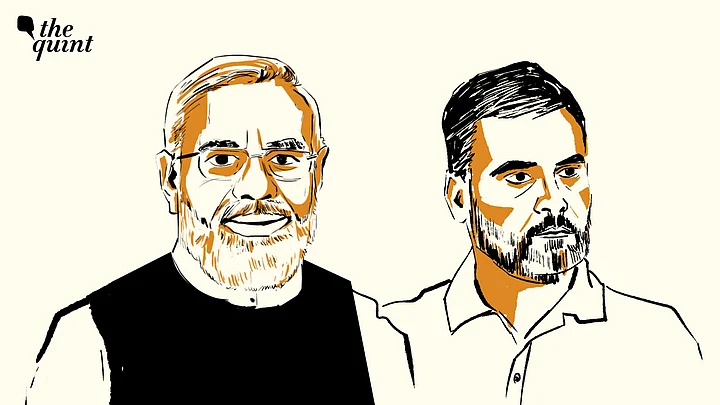In these final phases of my life, the last thing I had looked forward to was an election with such limited choices — not in terms of the number of parties but in terms of narratives within which we choose the leaders who would govern us.
The incumbents can claim — partially rightly — that they have managed to steer the economy to a relatively high growth path in very difficult circumstances, with the broken balance sheet they inherited in 2014, self-inflicted wounds like demonetisation, and significant global headwinds including COVID.
Commendable macroeconomic management, massive public investments in infrastructure adopting quintessential Keynesian principles, a state-of-the-art digital highway with a scaleable, multi-dimensional technology backbone enabling state-of-the-art digital services, and a safety cushion of free rations for the underprivileged during this period of transformation (through the trickle-down effect) is the mantra for making a Viksit Bharat.
Add to it an enhanced domestic defence manufacturing capability, creditably managing separatism, terrorism and Naxalite insurgency, and an overall assertive foreign policy — and we have a government which could legitimately be viewed by its supporters as having delivered reasonably well.
These supporters, though, do not have any coherent argument on the severe strain inflicted on the democratic fabric of India — the alienation of minorities, provoking majoritarian impulses, trampling of institutional independence, subjugating mass media, selective law enforcement, atrocities mounted by the state, police and vigilante groups on vulnerable sections, etc. The attempt to control our personal choices, and indeed lives, through vigilantism is suffocating.
The general lack of accountability to the common man, and indeed to the intent (not content) of the law, or trivialising facts and scientific thought through a vortex of structured misinformation through social media seems to have become the norm. In fact, any debate on such matters is impossible today without the use of decadent language, which those with dignity cannot endure. The outcomes we will generate will be less than optimum for a country of our scale and complexity if we continue on this path.
On the other hand, the Opposition remains fragmented, with low credibility, without a proper agenda, structure or coherent vision for the future. Whilst its commitment to democratic values and secular practices is deeply appreciated in current times, one wonders if it is a matter of mere convenience, survival or genuine commitment.
The label of corruption on many top leaders of the Opposition continues to stick, given the past — not that the uniquely peculiar phenomenon of the “washing machine” has gone unnoticed — and their ability to work together on a minimum common program is suspect given the absence of a statesmanlike Vajpayee ji or Narasimha Rao - both of whom led highly successful coalitions whilst ensuring substantive progress for the country. Also, it cannot be ignored that the policy execution capabilities of the Opposition, and its ability to make the bureaucracy work, have been far less effective than we have seen at present.
Of course, none of the two sides ever talks meaningfully of some of the existential issues which face us as a country: environment, education, health, malnutrition, women's safety, dwindling women labour force participation and AI-led job destruction.
In the politics of mangalsutra and mandi mein kya bhav, which divide us down the middle, and is possibly a mirror of how low we can stoop in the pursuit of winning elections, our politicians never speak on issues which affect our ability to bequeath united, peaceful, prosperous and progressive country firmly built on the Gandhian ideals instead of one descending into gradual chaos.
The sentiment that it is the quality of our political class that is holding India back from realising its immense potential has been expressed by various political commentators, academics and even some politicians. This is quite close to reality. Thoughtfulness in leadership with civility and meaningful content in public discourse, including in parliament, are missed.
Plato famously said that “democracy is a denial of the principle of qualification; it holds that every citizen has a right to participate in government; but this right must correspond to capacity, and the average person has neither the knowledge nor the native intelligence requisite for governance.”
And yet choose we must. A wise mentor had once told me — to curb my idealistic perspectives — that we must choose from the choices we have and not what we don’t have. And therein lies Hobson's choice in the present elections: do we vote for economic growth or retain the form of democracy with the idea of India as we knew it?
Both options have significant negative attributes which come with them as a neatly bundled package. It is ultimately a choice between lesser negatives — and therein lies the tragedy of contemporary India.
As Montesquieu said, centuries ago: If a republic is small, it is destroyed by a foreign force; if it is large, it is ruined by an internal imperfection. We would do well to remember these wise words of wisdom as we exercise our Hobson’s choice.
(Prabal Basu Roy is a Sloan Fellow from the London Business School. This is an opinion piece and the views expressed above are the author’s own. The Quint neither endorses nor is responsible for the same.)
